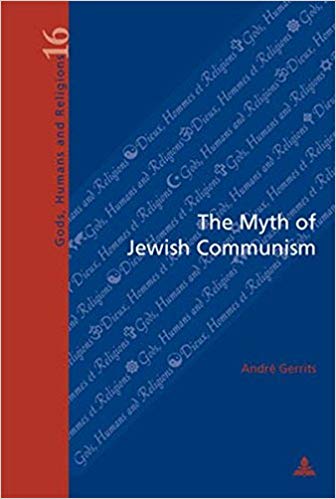Zydokomuna Denialism Backfires: Zydokomuna Elite INDISPENSABLE Gerrits

The Myth of Jewish Communism, by Andre Gerrits. 2009
An Attempt at Debunking the Zydokomuna Actually Validates It! The Indispensable Role of the Jewish Elite in Early Soviet and Soviet-Imposed Eastern European Communism
Author Andre Gerrits is Professor of International Studies and Global Politics at The Hague. His work seeks to “change the subject” from Jewish Communism to the anti-Semitic uses of this fact. (p. 117). But no matter: Facts remain facts.
THE ZYDOKOMUNA IS INESCAPABLE FACT. NOT JUST NUMBERS
Time and time again, Gerrits points out that Jews have been over-represented in Communism (e. g, p. 23, 117), and adds that, “Moreover, their [Jewish Communist] significance within most communist parties often considerably exceeded their strength in numbers.” (p. 23). And, unlike those who pooh-pooh the possibility of the Revolution spreading all over Europe in the years after 1917, Gerrits does not. (p. 83). [This also shows that the spectacular Polish victory in the 1920 Polish-Bolshevik war was a real and not a hollow victory.]
CRYPTO-JEWS CAUSE AN UNDERSTATING OF THE ZYDOKOMUNA
The numbers of Jews in Communism is a minimum estimate owing to the ubiquity of crypto-Jews. Gerrits admits as much, “But in general, party statistics failed to include or obscured the ethnic background of the leadership and rank and file…When registering for membership, Jews ‘nationalized’ their names and changed or hid their biographies, whether voluntarily or under pressure. In other words, we simply lack the empirical data to plausibly establish who among the rank and file and the sympathizers of communism in East Central Europe were Jewish and who were not.” (p. 24; See also p. 117 and p. 147). Time and time again (e. g, p. 23, 116, 195; including the “self-hating” Jews: pp. 184-185), Gerrits stresses the fact that Jewish Communists had varying affiliations with Judaism. This refutes the old “Jewish Communists were not really Jews” exculpatory canard.
WHY THE ZYDOKOMUNA: JEWS AS ROOTLESS COSMOPOLITANS
Without using the term in question, Gerrits validates it as he writes, “Jews had never demonstrated an excessive interest in the culture and politics of the nations in which they resided.” (p. 76). Along the same vein, Gerrits adds that, “The Jewish publicist Elias Hurwich alluded to the ‘psycho-physical agility’ of the Jewish people, which had brought them into the avant garde of trade, theatre, and press, and, most recently, revolutionary politics, He pointed at the ‘disintegrative’ (DEKOMPONIERENDE) role of the Jews.” (p. 101). Gerrits also cites the German Jewish publicist Moritz Rappaport as follows, “Moreover, Rappaport added, for a people with no connection to either soil or state, internationalism was a matter of course. Rappaport did not wish to rekindle anti-Semitic sentiments, he wrote, but he did wish to stress the differences between the Aryan and Jewish perception of things (EMPFINDEN)…Jews’ intellectual and analytical talents, as well as their persuasive powers had allowed them to incite the masses, which was precisely what had generated the current wave of radical anti-Semitism, according to Rappaport.” (p. 101).
JEWS AS THE BRAINS BEHIND COMMUNISM: JEWS AS AN INDISPENSABLE RULING ELITE IN EARLY COMMUNISM
Gerrits is candid about the real reason for the predominance of Jews in the Soviet-imposed Communist puppet governments of Eastern Europe after WWII. He writes, “There is another, more convincing answer as to why these communists and so many other Jewish comrades occupied prominent positions; they were urgently needed and THE PARTY HAD FEW ALTERNATIVES. (p. 150; Emphasis added). He reiterates that, “All early communist regimes struggled with a lack of reliable cadres. The party was in urgent need of its Jewish comrades. There were few other options.” (p. 198). In fact, Jewish Communists had earlier formed an indispensable ruling elite in the years after the Russian Revolution, as pointed out by none other than Nikita Khrushchev in 1955, “‘In the beginning Jewish intellectuals occupied the most important administrative positions in the Soviet Union, when there was no Russian intelligentsia yet’, he confided to a delegation of French socialists. ‘But today, this shortcoming has been eliminated; we can do without those Jewish officials.'” (p. 170).
JAN T. GROSS REJECTED ON ANGER-DISPLACEMENT AND DOUBLE COLLABORATION
Author Gerrits rejects the speculation of Jan T. Gross, who would have us believe that the Communists deliberately put many Jews in high positions so that public anger would be displaced away from Communism and unto the Jews. For one thing, there is no archival evidence to support it. (p. 152). Gerrits also doubts the Jan T. Gross (and Jan Grabowski) “double collaboration” hypothesis, wherein gentiles who supported Communism had earlier been compromised under the German occupation. (p. 159).
To see a series of truncated reviews in a Category click on that Category:
- All reviews
- Anti-Christian Tendencies
- Anti-Polish Trends
- Censorship on Poles and Jews
- Communization of Poland
- Cultural Marxism
- German Guilt Dilution
- Holocaust Industry
- Interwar Polish-Jewish Relations
- Jewish Collaboration
- Jewish Economic Dominance
- Jews Antagonize Poland
- Jews Not Faultless
- Jews' Holocaust Dominates
- Jews' Holocaust Non-Special
- Nazi Crimes and Communist Crimes Were Equal
- Opinion-Forming Anti-Polonism
- Pogrom Mongering
- Poland in World War II
- Polish Jew-Rescue Ingratitude
- Polish Nationalism
- Polish Non-Complicity
- Polish-Ukrainian Relations
- Polokaust
- Premodern Poland
- Recent Polish-Jewish Relations
- The Decadent West
- The Jew as Other
- Understanding Nazi Germany
- Why Jews a "Problem"
- Zydokomuna